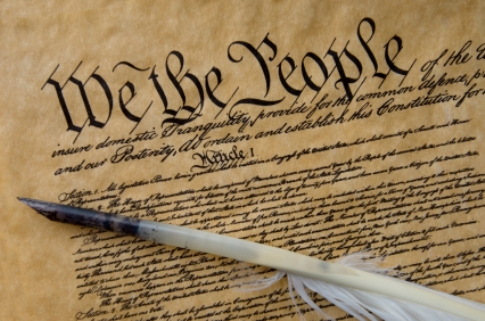Main Content
Lesson 1: Roles and Responsibilities of Government
- First Page
- Previous Page
- 1
- 2
- 3
- Next Page
- Last Page
The Constitution
On September 17, 1787 in Philadelphia, Pennsylvania, the U.S. Constitution was adopted with the expectation to provide a permanent guarantee of the political liberties achieved in the Revolution. The Constitution defines the structure and function of the federal government as well as guarantees all Americans that certain basic rights and liberties are protected.
During our study of legislative and executive level decisions in reaction to the 9/11 attacks, you will note the ongoing discussion and debate regarding the implications of those actions regarding the civil liberties and civil rights inherent in the Constitution. Unfortunately, many of these debates were undertaken by people who did not possess a grasp of the full contents of the amazing work of our founding fathers who authored the Constitution. To better understand this debate, it is a course requirement for you to read and review essential components of our Constitution.
Please note that this idea is the major theme throughout the document.
 The Preamble of the Constitution provides the fundamental justification for homeland security activities through the guarantee of domestic tranquility and the provision for the common defense of our nation. Additionally, the document guarantees a republican form of government in every state, the protection from invasion, and an application of the legislature or the executive protection against domestic violence.
The Preamble of the Constitution provides the fundamental justification for homeland security activities through the guarantee of domestic tranquility and the provision for the common defense of our nation. Additionally, the document guarantees a republican form of government in every state, the protection from invasion, and an application of the legislature or the executive protection against domestic violence.
To ensure these principles survive, the executive, legislative, and judicial branches of government formulate and review key guidance using a variety of means. As we progress during the course and study the laws, rules, and regulations enacted to combat terrorism and ensure our nation’s security, we will be continually faced with a fundamental question: How much liberty are we willing to surrender to the federal government in return for the objective of a more secure homeland? As students of this field and prospective practitioners of the craft, we must be ever mindful of the legal principles of our nation as outlined so dramatically by our founding fathers. As you review this week’s assignment on our Constitution, please keep this fundamental question as part of your thought process.
View the transcript of the United States Constitution
Reference
Brooks, J. (1992). Constitution: Forward and historical notes. Washington, DC: U.S. House of Representatives. Retrieved April 18, 2012, from http://www.house.gov/house/Foreword.shtml
- First Page
- Previous Page
- 1
- 2
- 3
- Next Page
- Last Page
